
Vol. 1, No. 11 Published by India China Division, Air Transport Command March 29, 1945
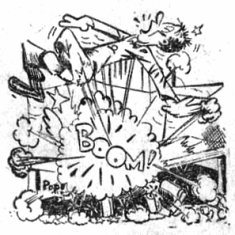 Enough Is Great Plenty,
Enough Is Great Plenty,Even If It's the Chaplain! 1337 BU, Assam - Chaplain Harold C. Diggs of this base has been spending a good many nights away from home. The chaplain, billeted with a pilot whose duty is the disposal of unexploded bombs, came home one night to find two objects under his bed that unmistakably were bombs. The fact that the bombs had been emptied of their contents was not something to be nonchalantly assumed, so the chaplain didn't sleep in his bed that night. A few nights later the chaplain's bed ominously displayed a small box, plainly marked "TNT," which didn't induce careless probing, so the chaplain slept elsewhere again that night. Time staggered on and the pilot laid hold of a discarded oxygen cylinder and covered it with the chaplain's blankets. Clearly the time for retaliation had come! A short-sheet job didn't impress the pilot much. Sleeping on blankets liberally sprinkled with sawdust had seemingly gone unnoticed. So one night when the pilot retired early, after quaffing a few beers, the chaplain set the stage. A collection of Chinese firecrackers was covered with a bucket near the pilot's charpoy and ignited. The resulting explosion catapulted the pilot from the arms of Morpheus with cries of "Man the slit trenches. They're pouring them in again!" Now the chaplain spends his nights at home! |
Service is Good,
Say Passengers
Of ICD's Liners
Travelers' Questionnaire Says Service In Flight Rated as Excellent
Hq., Calcutta - A tabulated analysis of travelers' questionnaires just released by the statistical control office reveals overwhelming approbation of ICD service by passengers chosen at random.
A breakdown of the quick estimates of overall service to travelers shows 92.4 percent terming it "excellent," and 7.6 percent "good," while none rated it "poor."
No Delays
One hundred percent of all queried answered "yes" to the question as to whether they had been specifically directed to a plane and correctly seated, had been adequately briefed on location of billeting office or required transportation, and provided with ETA or any other information requested.
Agreement was also unanimous that baggage had been carefully checked and delivered promptly and correctly and that satisfactory food had been made available on long flights.
The most adverse response to a specific query was to this: "Were you properly briefed regarding smoking and wearing of parachute?" Of those replying, 70.7 percent answered "yes," 29.3 percent "no."
Praise and Gripes
An extract of additional remarks is appended to the tabulation, including many gratuitous testimonials to ICD service in general, and in particular to flight clerks' courtesy and ability, making flight more like that experienced back home than any previously encountered overseas.
One man said, "In my ten years in the Air Forces I have never been treated better."
Gripes appear, too. One passenger wrote: "I would like to know by what authority the priority written into my orders was changed. This is the second time it has happened and I am getting tired of it." Another complained that he had not received sufficient notice before takeoff, while a third told of having been awakened far too early.
New Policy for Rotation of Air Crews
Calls for at Least One Year of Service With Division
Routine Changed To Decrease Tension and Strain of Piling Up Many Hours in Short Time;
750 Hours of Hump Time Required
Hq., Calcutta - A new policy, effective immediately, governing rotation of ICD air crews has been announced here.
The most important change provides that all air crew members - pilots, co-pilots, radio operators and flight engineers - will serve a minimum of one year with ICD, even if minimum flying hours are completed in less than a year.
Previous flying hour requirements for rotation were 650 hours Hump of combat time and 1,000 hours India wing time, with no minimum length of service in ICD.
Under new policy, minimum flying time is: in Assam, Bengal and China wings, 750 hours; in India wing, 1,000 hours. Administrative pilots in Assam, Bengal and China wings will fly 500 hours and serve 18 months; in the India wing, 600 hours and 18 months. Radio operators and aerial engineers on administrative status are subject to the same requirements.
The new requirements for Assam, Bengal and China wing air crew members will apply to all who have accumulated less than 400 combat hours in ICD as of March 1. All who have more than 400 hours will be rotated under the
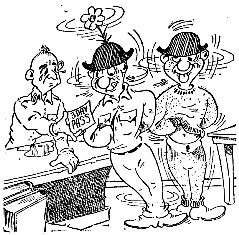 "No sir, that's not the paper we're looking for."
"No sir, that's not the paper we're looking for."
|
CG Explains
In announcing the new policy, Brig. Gen. Tunner said:
"The reasons for these changes are several. It is imperative that we relieve our crews of their present tension - of the pressure to build up maximum hours in minimum time.
"The longer periods of service are not only to the benefit of the crew members, themselves, but promote more complete utilization of flying skill, a better flying safety record and altogether, a more efficient operation.
Provides for Rest
"The increasing demands made on ICD by the developing military situation make it essential that this command maintain the highest possible experience level among its crews. Because of the problems presented by weather, it is extremely important that air crews achieve a seasonal experience which can be utilized a second time. The longer periods of service are essential to ICD's program to reduce gradually the amount of flying time per month per pilot.
"The policy provides for crew members to take advantage of, and to gain from, rest camps, rest periods, jungle camps, leaves and all other facilities which keep a man physically and mentally fit."
EMs Given Commendation For Unloading Transports
1338 BU, China - A commendation went to seven enlisted men of this base last week when they unloaded 83 transports in a seven hour graveyard shift.
The commendation, for "resourcefulness and devotion to duty under the most trying circumstances," went to S/Sgt. Wesley E. Longhofer, Sgt. Glennvill F. Casto, Cpl. Clarence E. Pincke, Pfcs. Ralph B. Clary, Clarence B. Price and George E. Ray, and Pvt. James C. Brennan.
Despite the handling of such heavy equipment as caterpillar tractors without adequate facilities, the actual unloading time averaged only three minutes more than the usual time.
The citation said:
"In many instances unloading ramps were not available, and, where this condition existed, a human chain passed cargo down to trucks . . In spite of the intense cold which occurs at this altitude and time of morning, the men were perspiring freely, and as rapidly as one plane was finished they would climb onto another. A spirit of co-operation and cheerfulness existed throughout this record period."
Carrying the indorsement of Maj. Moses C. Traver, CO, the commendation came from Capt. Wendell Harding, assistant director of P & T.
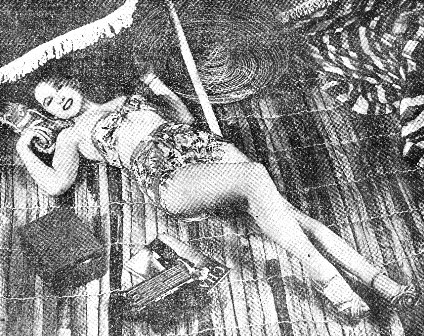 A Warhawk is a trim, maneuverable little number that has seen plenty of action during this ware. Here, named
after the Warhawk and looking very unfighter-like, though trim enough, is Margaret Gilbert. She's a tool crib
clerk at the Kenmore, N.Y. plant of Curtiss-Wright.
A Warhawk is a trim, maneuverable little number that has seen plenty of action during this ware. Here, named
after the Warhawk and looking very unfighter-like, though trim enough, is Margaret Gilbert. She's a tool crib
clerk at the Kenmore, N.Y. plant of Curtiss-Wright.
|
DFC, Air Medals
Will Require More
Flying After April 1
Hq., Calcutta - Requirements for the Air Medal and Distinguished Flying Cross have been revised in a new ICD regulation, effective April 1.
Under the new policy an individual will be considered for award of the Air Medal after completing 250 operational hours and for the DFC after 500 hours. A proportionately higher number of flying hours will entitle an individual to consideration for oak leaf clusters to the Air Medal and DFC.
Formerly airmen could be recommended for the Air Medal after 150 operational hours and for the DFC after 300.
If an individual has not completed the required number of hours under the old policy by March 31, he must meet the new requirements to be considered for the awards. Time flown both prior and subsequent to April 1 may be counted, however, in determining eligibility under the new policy.
To Pick 'Pretty Boy' - What'll They Do Next ?
At abase here in India a bunch of GIs perhaps are getting too much sun.
What they're up to is the selection of the handsomest GI on the base. "The vital question will be settled, once and for all minus the usual hair-pulling, in just one week and the results will be made public," goes the announcement in the base newspaper.
Ed. - What are you going to do with him after you've got him?
Ring Around Rosy Played by Aircraft Over Base in China
1344 BU, China - A giant "ring around the rosy," played with airplanes instead of children, is not an unusual event over this base.
When the overcast closes in - more the rule then the exception - heavy air traffic must circle and circle, each ship awaiting its turn to duck down through the clouds to the field which often has only a few hundred foot ceiling.
First come is first served, and the control tower allots priority to the planes droning around in a giant circle over the fleecy white clouds. For obvious safety reasons, only one ship is let down at a time.
A familiar situation, on heavy Hump traffic days, is 20 or 30 aircraft going 'round and 'round a mysterious spot over the clouds.
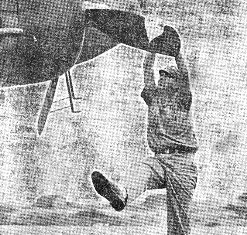 Have you any idea what a helluva job it would be to start a C-47 engine by hand? It has been done!
One man in ICD big enough and strong enough to do it is Maj. Charles C. "Slim" Basley, Assam wing maintenance
officer. However, even he doesn't do it every morning before breakfast.
Have you any idea what a helluva job it would be to start a C-47 engine by hand? It has been done!
One man in ICD big enough and strong enough to do it is Maj. Charles C. "Slim" Basley, Assam wing maintenance
officer. However, even he doesn't do it every morning before breakfast.
|
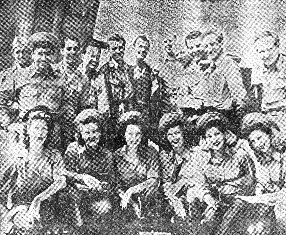 1330 BU, Assam - This base had more than its share of good entertainment in one week. Two GI shows, "Babes in Boyland," and "Jungle
Rhythm," played here.
Later Tony Martin's ICD "All Clear" show arrived just as the cast of "Happy Holiday" was ready to pull out.
1330 BU, Assam - This base had more than its share of good entertainment in one week. Two GI shows, "Babes in Boyland," and "Jungle
Rhythm," played here.
Later Tony Martin's ICD "All Clear" show arrived just as the cast of "Happy Holiday" was ready to pull out.
|
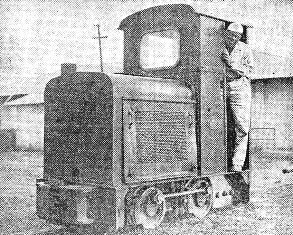 1337 BU, Assam - A Pullman porter's dream to "ascend to the cabin" like the immortal Casey Jones came true for Sgt.
Henry L. Belliny when he came to this base. Near the camp he found a miniature railroad with a diminutive diesel powered
locomotive, used to connect the widely separated stations on an extensive tea plantation.
1337 BU, Assam - A Pullman porter's dream to "ascend to the cabin" like the immortal Casey Jones came true for Sgt.
Henry L. Belliny when he came to this base. Near the camp he found a miniature railroad with a diminutive diesel powered
locomotive, used to connect the widely separated stations on an extensive tea plantation.
|
Search Lights Now Operating As Plane Guide
800,000,000 Candle Power Lights Pierce Clouds To 20,000 Feet
1333 BU, Assam - Totaling 800,000,000 candle power, four huge searchlights have gone into operation at this base to help pilots locate the runway on foggy nights.
The four light beams intersect at a point 3,000 feet above the center of the runway, indicating its exact location.
First Used in China
ICD first used the giant lights more than a year ago at one of the largest bases in China, to bring in lost planes. At the time, the lights were put into use because of necessity, with satisfying results. The idea took root and the lights were ordered for other bases.
On an evening when this base was almost completely "socked in" the lights went on trial. Bewildered GIs and officers gazed up at the illuminated sky which resembled pictures they had seen of London during its air raids.
From the ground, base engineers, contacted different planes to determine the altitudes and distances from which the beams could be seen by the air crews. The reports were better than anticipated. The beams were reported to have been visible to a height of 20,000 feet and as far as 45 miles away.
Guide Ship In
On the second night the weather was even worse than the previous night. A plane was circling the field, able to contact the tower but unable to receive. By request of the operations officer, the lights swung into action and the ship came in for a safe landing, without instructions from the tower.
A representative of the British government, who had initiated lighting of the skies in England, had been sent here to instruct ICD personnel in the use of the giant lanterns.
Tech Sergeant Is Single Man Utilities Section
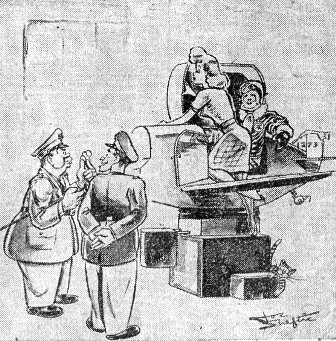
|
Does Everything from Road Repair to Runway Lighting
1329 BU, Assam - The 'one man utilities section," T/Sgt. Ridley Brown, has been performing wonders at this base, doing everything from keeping the roads repaired to fixing the water system.
All work is supervised by Brown, who was an automobile mechanic in civilian life. It was Brown who was recently awakened about 1 a.m. as the only man who could do something about the water supply that had suddenly shut off. Operations were being held up and nobody knew what to do, except Brown.
Uncharted Digging
He dug into the heart of the maps and blueprints of the base piping system, looking for the cut-off valves. Using the process of elimination, he narrowed the trouble down to a certain area. Of course that would be the one location for which there was no blueprint!
There was only one thing to do - dig. He wasted no time getting started. After hours of slaving in the morning darkness, he came to a spot where there had been some underground construction. Here he found the uncharted cut-off valve. It had been closed for some other work and someone had neglected to turn it back on. All Brown had to do was turn on the lever and the water flowed.
Praise From CO
Besides supervising the water supply, the versatile sergeant is in charge of building roads, repairing electric saws, fixing plumbing, electrical wiring, putting in runway lighting, maintaining buildings, and a multitude of other duties.
He has his uncomfortable moments too, and one occurred while he was welding a pipe on top of the movie screen. many yards of Hessian cloth were draped around. In one quick, hot blast the cloth went up in flames with Brown in the middle of the fire. With his pants burning he leaped from his perch and spent no time flat in putting out the flames. He suffered no serious injuries.
While commendations are few in the utility business, Brown has received praise for his services from the CO, "I'd take an entire outfit like him, any day," his CO said.
'Canteen of the Air' is Regular Feature Over Sound Waves
1333 BU, Assam - A new feature of the Victor George radio station here is the "Canteen of the Air," to be heard every Friday at 6:45 p.m.
Guest speakers on the first program were Brig. Gen. Cranston, Brig. Gen. Pick, and Lt. Col. Charlie F. Skannal, CO here.
The program is under the supervision of Mrs. Susan Prescot, American Red Cross director, who was a musical comedy star and appeared in many broadcasts over New York's NBC. Purpose of the program is to point out what ARC is doing in this theater.
Each week one of the most outstanding individuals on the base will be selected as "soldier of the week" to be interviewed as the Canteen's guest. ATC's full symphony orchestra will play request tunes.
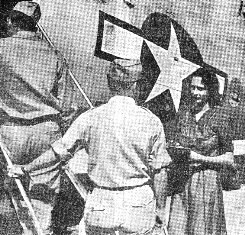 As ICD steps up its passenger service, women are being hired as passenger agents. In New Delhi, Mrs. Hether Behetts, first woman PA in ICD, checks travelers boarding a plane bound for Calcutta.
As ICD steps up its passenger service, women are being hired as passenger agents. In New Delhi, Mrs. Hether Behetts, first woman PA in ICD, checks travelers boarding a plane bound for Calcutta.
|
What is ICD Coming To?
A Woman Passenger Agent!
1307 BU, New Delhi - The disappearing era of the harum-scarum bucket seat operation moved back into deeper oblivion this week. For the first time in the history of ICD a woman passenger agent greeted travelers who disembarked from transport planes here.
Employed on Wednesday to relieve the personnel shortages at the base here, the new PA, blonde, petite, Mrs. Hether Behetts, received a hurry-up indoctrination course on Thursday and handled her first passenger on Friday.
Mrs. Behett's new duties include those never before entrusted to a civilian in the division. The varied routine of her workday traverses the gamut from booking of passengers via telephone, to acting as information clerk to new arrivals in Delhi.
Only hitch in the new venture was the trouble transients seemed to have in pronouncing Mrs. Behett's tricky two-syllable name. The solution was a sign on her desk reading "Mrs. Betts."
At the end of her first week of duty the official stamp of approval was placed on her work by Capt. L. D. Gardner, chief P & T wallah.
Twin Brothers Are Reunited at 1328 BU After 17 Months in Separate Theaters
Wanted Different Classifications So Separated After Basic
1328 BU, Assam - After almost two years of serving apart, twin brothers Cpl. Dave and Pfc. Joe Orr, have been reunited at 1328 BU.
Dave had 17 months' overseas duty with an ASC unit in England while Joe has been in India for 12 months.
The two were separated because of individual preferences expressed to classification when they entered the Army in April, 1943. The War Department tries to keep twins together if possible.
Came Overseas First
After taking basic together at Atlantic City they parted, Joe going to Scott Field and Dave going to Colorado State College for engineering-operations training. Joe's radio schooling took longer, so Dave beat him overseas.
A couple of months ago they decided to try to get together. Joe requested a transfer to the ETO and Army wheels were set in motion. By the time they stopped grinding, Joe was still here - but Dave was transferred to India, too.
Their foster parents, Mr. and Mrs. Harold C. Barie, live at East Bethany, N.Y., where the twins have caused confusion for years.
Dave used to take piano lessons for Joe, while Joe would return the favor by doing something Dave disliked; their draft board started pulling hair when Dave came up for examination a few minutes after his brother; and they've taken many a bawling out for each other without a murmur.
Now that they are in the same outfit, it won't surprise anyone to hear that the medics try to give one of them too many shots. When that happens it probably won't be without a murmur.
Over the Hill and Through the Teapatch to the Golf Course
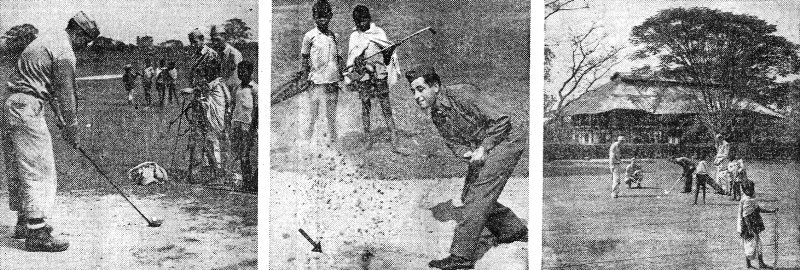 With S/Sgt. Hullinger, Sgt. Hepding and a number of Indian caddies looking on, Cpl. Leard addresses his ball for the
drive from the first tee. Now, now lieutenant (center) don't lose your temper. "Even Bobby Jones gets in these ruts sometimes,
I guess," says Lt. Waldman as he digs deep after one in the sand trap. Indian caddies watch with mixed expressions of
sympathy and patience. End of an enjoyable day (right) on the well kept tea planters' golf course just a short distance
from 1337, BU, arrives as one of the foursome tries to sink a long putt on the ninth green in front of the bungalow-type
club house.
With S/Sgt. Hullinger, Sgt. Hepding and a number of Indian caddies looking on, Cpl. Leard addresses his ball for the
drive from the first tee. Now, now lieutenant (center) don't lose your temper. "Even Bobby Jones gets in these ruts sometimes,
I guess," says Lt. Waldman as he digs deep after one in the sand trap. Indian caddies watch with mixed expressions of
sympathy and patience. End of an enjoyable day (right) on the well kept tea planters' golf course just a short distance
from 1337, BU, arrives as one of the foursome tries to sink a long putt on the ninth green in front of the bungalow-type
club house.
Surprised Clerks Get Liquid Gold From Grateful Pilot
1333 BU, Assam - Pfc. Robert S. Seekings, of Fredonia, N.Y., and Pfc. William Stanzione, of Trenton, N.J., billeting clerks, admittedly were unprepared for what happened at the billeting office the other night.
A turnaround pilot to whom they had cheerfully rendered the usual services, toddle into the office carrying a case of Schlitz beer on his shoulder. He deposited his burden on the counter and said laconically:
"It's all yours, split it up!"
At first they thought he was kidding, but when he insisted he was serious, they gasped and only with great difficulty were able to get out a weak, "Thank you."
The magnitude of the gift best can be judged by the fact that in China the beer ration is two cans monthly per man.
Awaiting Discharge To Take Commission In Navy Patent Dept.
1338 BU, China - One reads stories about GIs who get letters and cards on their draft status from local boards long after they're in the Army, but here's a delayed-action story with a new twist and a happy ending to boot.
Sgt. Jack Schley, of Dallas, Tex., personal affairs NCO here, has been wearing khaki and olive drab for two years and four months and he's been overseas since July, 1944.
Three and a half years ago Sgt. Schley applied to the Navy for work in the patent department. Week before last the application was answered - and accepted. In the offing are a discharge from the Army and a direct commission in the Navy which is belatedly discovering a shortage of qualified patent attorneys to act on civilian inventions which can be used in winning the war at sea.
Sgt. Schley practiced law in Dallas and Houston and Washington, D.C. for 12 years before coming into the Army.
Flying Safety Office Putting Out Bulletins To Alert Air Crews
A new method of alerting operational personnel to the hazards of careless and irresponsible procedures has been instituted by the flying safety office.
Twice weekly, a bulletin, highlighting an accident in the division, will be prepared and sent to all bases. The accident so described will be one applicable to operations at all the bases.
Dubbed "Crash Flashes," the bulletin will single out an accident due to personnel error and pointing out exactly who was at fault and what must be done to prevent such errors in the future.
Old Hospital Now Air Freight Terminal
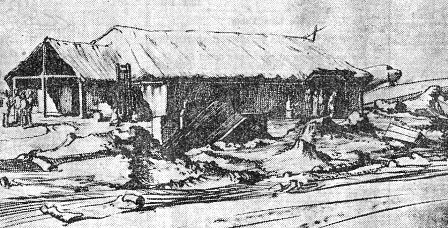 Not so many months ago, when fighting centered around this forward ICD bas in North Burma, the building shown here was
an evacuation hospital. Now it is an air freight terminal. The debris of war - bashed helmets, bomb fragments and other
shattered rubbish - is seen in the foreground of this brush drawing by Capt. James P. Scott, ICD artist.
Not so many months ago, when fighting centered around this forward ICD bas in North Burma, the building shown here was
an evacuation hospital. Now it is an air freight terminal. The debris of war - bashed helmets, bomb fragments and other
shattered rubbish - is seen in the foreground of this brush drawing by Capt. James P. Scott, ICD artist.
Search for Nylons Filters into Karachi
1306 BU, Karachi - Maybe the advertising department doesn't know it but even in India the good old farmer's bible, a Sears-Roebuck catalogue, is a morale booster. When the wish book arrived at Karachi, three EMs and two ARC girls gave it the once-over. The gals looked for nylons; a guy named Saul, for zoot suits, and one pawed the index for bobby socks.
Chalking Up Generals By Stars These Days
1310 BU, Columbo, Ceylon - A galaxy of stars flash in and out of this base in the form of VIPs, and the business of making out reports each week becomes a monotonous chore. The writer of a recent report was at least momentarily inspired and worded it thus: "During the past week this unit received 23 general officers totaling 48 stars."

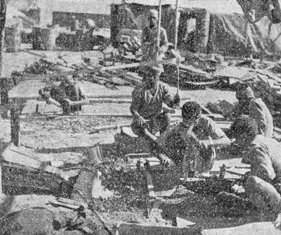 1348 BU, North Burma - here is the blacksmith shop of the Cochin State Labor unit where local help fashions high-grade
essential tools for this base.
1348 BU, North Burma - here is the blacksmith shop of the Cochin State Labor unit where local help fashions high-grade
essential tools for this base.
|
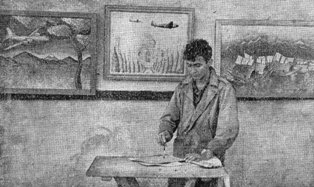 1327 BU, Assam - Pfc. Pasquale M. Brignolo, soldier-artist here, is proud of the painting on the right, "Wash Day
Amid the Himalayas." Lt. Nicolai Khuvshinoff, director of art work here, thinks the watercolor will likely bring
the artist recognition in future Army art contests.
1327 BU, Assam - Pfc. Pasquale M. Brignolo, soldier-artist here, is proud of the painting on the right, "Wash Day
Amid the Himalayas." Lt. Nicolai Khuvshinoff, director of art work here, thinks the watercolor will likely bring
the artist recognition in future Army art contests.
|
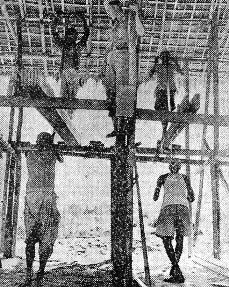 1330 BU, Assam - Pvt. Luther Carpenter watches an Assam sawmill in action here. Carpenter's sawmill at
Erbacon, W.Va., was somewhat more mechanized.
1330 BU, Assam - Pvt. Luther Carpenter watches an Assam sawmill in action here. Carpenter's sawmill at
Erbacon, W.Va., was somewhat more mechanized.
|
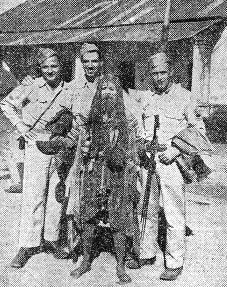 1333 BU, Assam - Left to right: Sgt. Eric Daniel, M/Sgt. Albert Brown, and T/Sgt. Ray Lash. Front and center:
"Ole Man Mose," grotesque greeter of anyone who ventures into the local village.
1333 BU, Assam - Left to right: Sgt. Eric Daniel, M/Sgt. Albert Brown, and T/Sgt. Ray Lash. Front and center:
"Ole Man Mose," grotesque greeter of anyone who ventures into the local village.
|
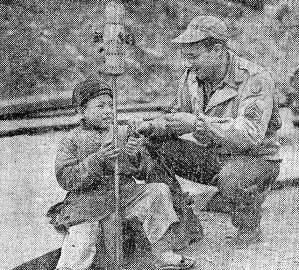 1344 BU, China - T/Sgt. E. P. Luna, Bronx, N.Y., pays 20 Chinese dollars for a lollypop to add to his collection
of souvenirs garnered over a 16-month tour of duty in China. The little tot's smile indicates a good day at vending.
1344 BU, China - T/Sgt. E. P. Luna, Bronx, N.Y., pays 20 Chinese dollars for a lollypop to add to his collection
of souvenirs garnered over a 16-month tour of duty in China. The little tot's smile indicates a good day at vending.
|
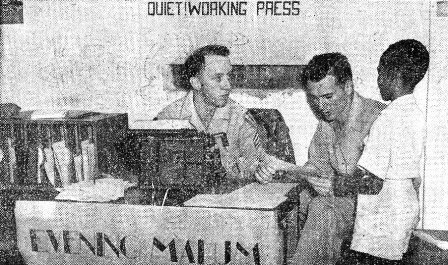 1311 BU, India - Evening Malum, ICD's only daily newspaper, boasts its own copyboy in 11-year-old Sita Ram who comes
running when somebody yells, "Copy!" Sgt. Robert M. Dillet (left) of Ambler, Pa., and Cpl. Elliot Frankel, New
Brunswick, N.J., started the paper.
1311 BU, India - Evening Malum, ICD's only daily newspaper, boasts its own copyboy in 11-year-old Sita Ram who comes
running when somebody yells, "Copy!" Sgt. Robert M. Dillet (left) of Ambler, Pa., and Cpl. Elliot Frankel, New
Brunswick, N.J., started the paper.
|
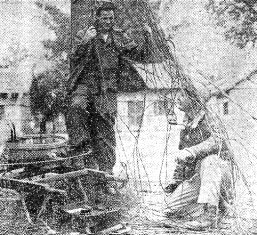 1327 BU, Assam - If the switchboard operators gave a few wrong numbers on this day they might have found their
trouble here. Cpl. William Wantland, Nashville, Tenn.., parts a maze of wires to watch his fellow sufferer, Pfc.
Thomas Halligan, Troy, N.Y. Both are communications men.
1327 BU, Assam - If the switchboard operators gave a few wrong numbers on this day they might have found their
trouble here. Cpl. William Wantland, Nashville, Tenn.., parts a maze of wires to watch his fellow sufferer, Pfc.
Thomas Halligan, Troy, N.Y. Both are communications men.
|
Fueling Record Set By Crew at 1347th
1347 BU, India - This base has established what is believed to be a theater fuel servicing record.
In eight hours from 7 a.m. to 3 p.m., six men operating F-1 service units serviced 22 planes, with a total of 56,101 gallons of high-octane gasoline.
Cpl. L. R. Pugh, NCOIC of the operation, Cpl. M. R. Cox, Pfcs. O. J. Murphy, R. W. Lehman, H. J. Koivisto, and Pvts. R. E. Mitts and H. W. Anderson, were in the crew which broke the previous known ICD record.
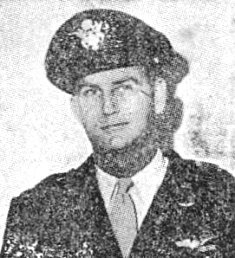
|
More Than 10,000 Flying Hours
Is Civilian and Military Record
Of 1305th Commanding Officer
Barnstormed Circuses, Fairs, Flew Hospital Ship For Physician
1305 BU, Calcutta - Flight conditions encountered in ICD are perhaps as well known to Lt. Col. Clayton E. Joyce, 1305 CO, as to any pilot in the division.
As a prelude to what was in store for Hump pilots, the ATC set up at Reno, Nev., a training school under the guidance of Col. Joyce. He subsequently helped establish the Third Operational Training unit at the Reno airbase for high altitude transitional training. Just prior to coming overseas in January, 1944, he was in charge of training at the Reno base.
After he arrived in ICD he became the first chief pilot of the division. As such he was responsible for distribution of flight crews, development of en route flight procedures and coordination of recommendations as to location of radio range stations and visual aids to navigation.
Airline Pilot
A veteran pilot since his barnstorming days in 1929, Joyce has logged more than 10,000 flying hours - 9,000 with commercial concerns and the remainder as a military flyer. He holds a senior pilot rating.
As captain for United Airlines, Joyce flew every run west of Chicago. He flew from Vancouver to San Diego, from Chicago to San Francisco, and from Portland, Ore., to Salt Lake City, Utah. He was employed by the line from 1933 to 1942.
Commissioned In 1936
His varied flying experience includes several years' employment by Sioux Falls, S.D. firm for which he worked as charter pilot and flight instructor. He barnstormed carnival and county fair circuits, hauling passengers. He also flew an ambulance plane for a physician speeding patients to hospitals and clinics.
Joyce was commissioned a second lieutenant in the Air Corps reserve in 1936. Called to active duty in 1942, he spent six weeks at Morrison Field, Fla., and then joined the staff of the First OTU at Rosecrans Field, St. Joseph, Mo. He served as commandant of students and later CO of Hq and Hq squadron, before he proceeded to Reno. Before coming to 1305, Joyce was CO of a large Assam base.
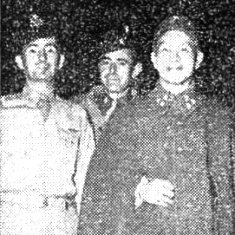 Left to right: Lt. Col. Gregory F. Keenan, Lt. Col. Walter R. Mungoran and Generalissimo Chiang Kai-shek.
Left to right: Lt. Col. Gregory F. Keenan, Lt. Col. Walter R. Mungoran and Generalissimo Chiang Kai-shek.
|
General Chiang Kai-shek
Visits ATC Installation
1342 BU, China - Demonstrating his keen interest in the ATC installations in China, Generalissimo Chiang Kai-shek included this base in his itinerary on a recent tour of this part of China.
Accompanied by his staff, the generalissimo's party arrived here without advance notice in two C-47s. Fully equipped Chinese soldiers, however, in expectation of his arrival had formed a guard of honor. The visiting officers drove first to a nearby encampment of American-trained Chinese troops. They returned to this base later in the afternoon where a tea had been prepared in the ICD line mess. There he talked with Lt. Col. Gregory F. Keenan, and invited the CO to his home in Kunming.
Among the high-ranking officers who accompanied the generalissimo were Maj. Gen. J. L. Huang, the general's aide; Gen. Chien Ta Chun, chief of general affairs and executive officer of the National Military Council; Lt. Gen. Tu Bi Ming, commanding general of the Chinese Fifth army; Wong Tse Min, deputy CO of the Fifth and Lt. Gen. Yu, the generalissimo's chief bodyguard.
These officers, who arrived in a C-47, remained overnight and quickly made friends among the officers here. Gen. Huang made an inspection of the ATC hostel area and complimented the unit in glowing terms for the work being performed here.
GI Mixologist Whips Up Tom Collins in China
Substitute for 'Jing Bao' Makes Hit With His Buddies
1338 BU, China - Convinced that necessity is the mother of invention, Cpl. "Tom" Farnsworth, of this base, decided that something should be done about the local "Jing Bao" situation.
As a result, Cpl. Farnsworth is now in open competition with local brewers and has succeeded in turning out what he calls a Chinaside Tom Collins.
Every few days Cpl. Farnsworth takes his jug to one of the local wholesalers and purchases the basic ingredient, rice wine, and returns to his barracks for the business of mixing and brewing.
After adding a dash of this and a pinch of that, he proceeds to heat it to "remove any original impurities." Once the lemon, water and sugar have been dissolved and cooled, the concoction is bottled and left to age for a couple of days.
"After a hard day at the office," remarked Farnsworth, "there's nothing like coming home to a nice glass of pure, tantalizing Tom Collins. The only thing, though, is that so many of the other guys have the same notion that it's getting to the point where I'm going to have to issue ration cards of my own."
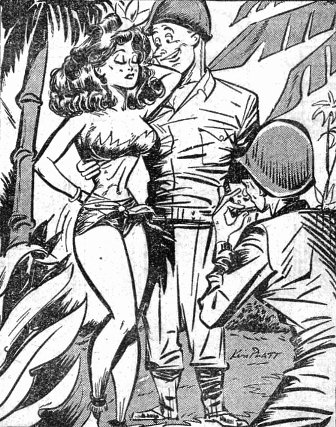 "Smile, baby - I want my wife to think I'm having a good time..."
"Smile, baby - I want my wife to think I'm having a good time..."
|
Airway Detachment Oldtimers Pack Duds,
Pull Out for States
1339 BU, China - Some real oldtimers, the last of an airways detachment at this base, are finally going home.
The five men sailed from Virginia in October, 1942, and since have seen duty at ICD bases from the west coast of India to the western part of China. They have pioneered bases in both India and China and helped solve the many problems that came up in the early days of Hump flying.
Arriving in India just a few months after the first Army flight over the Hump, made by Col. (now BG) William Donald Old, these men have watched ICD grow - for 29 months - into the large freight-carrying organization it is today. In that job they have had no small part.
Rotation? Just Ask T/Sgt. Gerald Ryan - He's Had His!
1311 BU, India - T/Sgt. Gerald Ryan, an instructor in the radio operator's school here, probably doesn't boost the morale of his buddies much when he starts talking rotation.
Sgt. Ryan came in for four short months in Uncle Sugar after 27 combat missions over Germany as a radio gunner. He wears the Air Medal with three oak leaf clusters for participating in nearly every important raid over Germany between May and November, 1944.
After spending a short time at his home in New London, Conn., and other spots in the U.S., he was sent to India. He like the idea of "no buzz bombs" and fairly beams over the showers and running water which he didn't expect to find here.
HUMP EXPRESS is the official newspaper of the India-China Division, Air Transport Command, APO 192, c/o Postmaster, New York, N.Y., and is published by its Public Relations office. Camp Newspaper Service and Army Newspaper Service features are used, reproduction of which is prohibited without permission of CNS and ANS, 205 East 42nd St., New York, 17, N.Y. Other material is submitted by staff members, ICD-ATC base Public Relations sections and other soldier correspondents. Printed weekly by the Hindusthan Standard, 3 Burman St., Calcutta, India, and distributed each Thursday. Passed by U.S. Press Censor for mailing.
| Military transport schedules over India for cargo, personnel and mail . . . maximum tonnage of essential war materials over the Hump . . . movement of troops and supplies in support of tactical operations in China . . . evacuation of the sick and wounded - these are the missions of ICD-ATC. |

MARCH 29, 1945
Original issue of HUMP EXPRESS shared by CBI veteran Steven C. King, author of Flying the Hump to China.
Copyright © 2006 Carl Warren Weidenburner
TOP OF PAGE PRINT THIS PAGE ABOUT THIS PAGE E-MAIL YOUR COMMENTS
PREVIOUS ISSUE HUMP EXPRESS BASE NEXT ISSUE